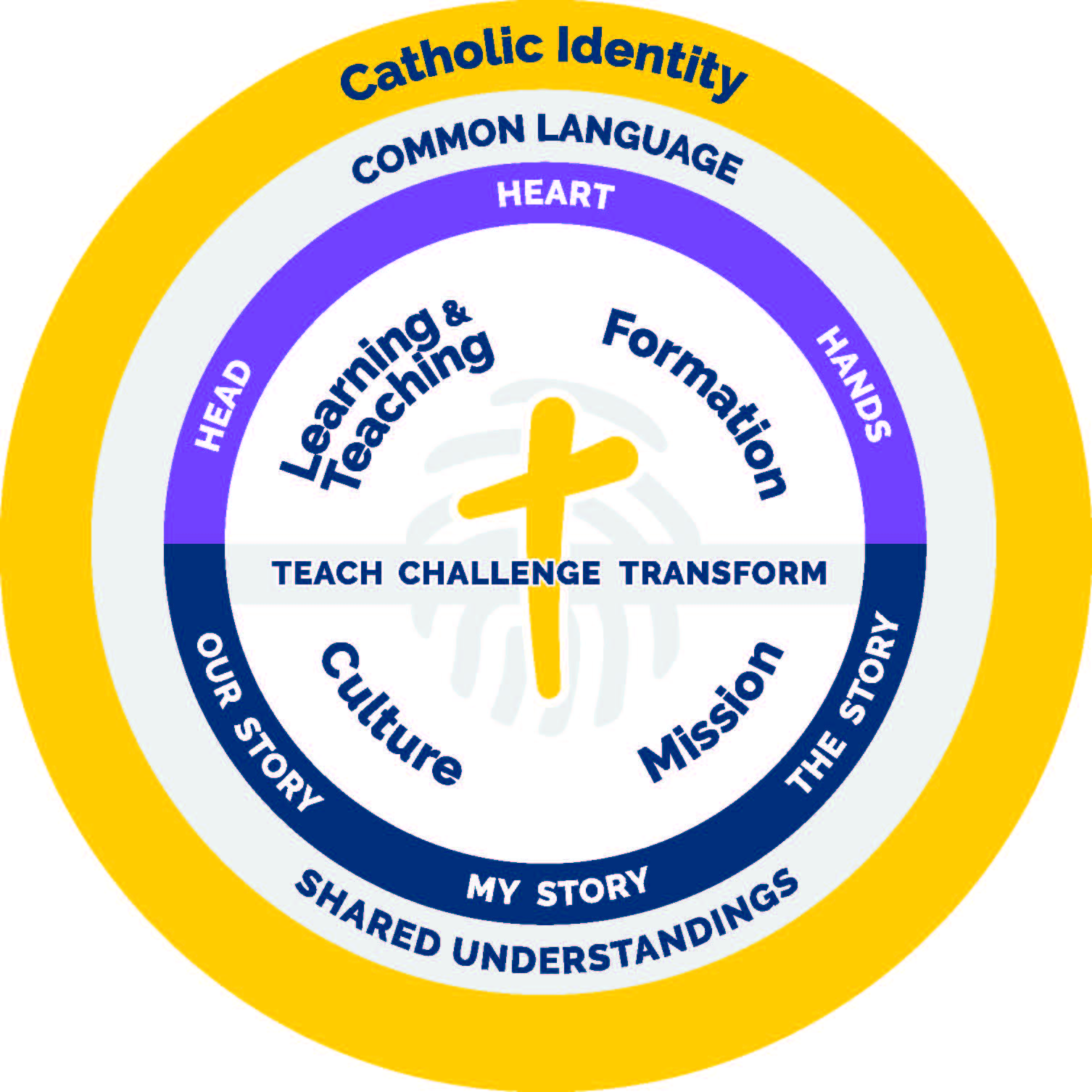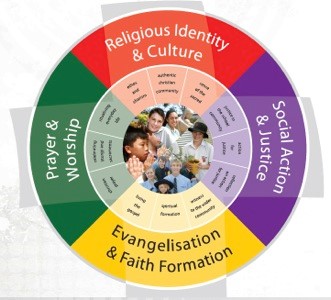Catholic identity is a keystone for the evangelising mission of all Catholic education communities. It is expressed in structures and processes; in curriculum and the learning environment; in the formation of staff to support, teach and lead; in strategic planning and community culture; the wellbeing of students; and the engagement of parents, parish and wider community.
Brisbane Catholic Education defines Catholic Identity as the way in which the Gospel of Jesus is given living expression throughout every school and office community. A contemporary Catholic Identity is borne of the encounter between faith, life and culture. It deeply permeates structures, processes, relationships and the learning and teaching context in a way that offers all students lifelong meaning and purpose.
Holy Spirit College ensures that the Catholic Christian tradition is clearly visible in the contemporary context, fusing the old with the new, so that meaning can be made for students, parents, staff and the wider community.
This engagement echoes the call and ministry of Pope Francis: that we understand the changing realities of our world and respond to the multi-cultural and multi-religious dimensions of the society in which we find ourselves (CCE April 7, 2014).
Holy Spirit College prepares our students for life in a contemporary society: a life that can make meaning and shape purpose through the lens of a Catholic worldview which re-interprets Catholic faith in contemporary times. In accordance with this position, all facets of life in the school are Christ-centred, student focussed communities of learning that nurture and include:
A culture of dialogue:
- Choosing to explicitly emphasise our Catholic inspiration in authentic dialogue with other world-views in the broader culture
A contemporary theology of mission:
- Understanding that we are part of the wider “participation in God's existence in the world." This is a “single but complex reality," of proclamation witness and commitment to justice, reconciliation, peace and the integrity of creation
A post-critical belief system:
- Moving beyond relativism and literalism to embrace symbolic religious imagination and critical thinking in a continuous re-interpretation of faith.
Holy Spirit College is called to act in each of the four dimensions of the Catholic Identity Framework

©️Brisbane Catholic Education, Catholic Identity, 2021
Mission
- Build and apply an understanding of mission leadership in Catholic schools
- Connecting the school vision, mission and values to the BCE and Archdiocesan vision, mission and values and apply to all aspects to school life
- Ongoing professional learning and formation around leadership for mission in Catholic schools and leading Catholic identity.
Formation
- Engage in planned, sequential and developmental staff formation that nurtures the individual in their vocation of education in Catholic schooling
- Develop and implement planned, sequential and developmental student formation opportunities
- Develop a holistic and ongoing plan for the orientation and induction for all staff, particularly teachers who are in the beginning stage of their careers.
Learning and Teaching
- Embed a Catholic perspective across the identified learning areas
- Enhance classroom teaching of religion
- Foster a post-critical belief of scripture through the R.E curriculum (Three Worlds of the Text)
Culture
- Review school engagement with the Religious Life of the School and prioritise areas for renewal
- Ensure cohesion between policies and procedures and the Catholic worldview as articulated through Vision and Mission statements.
Religious Life of the School
Religious Education in the contemporary Catholic school comprises two distinct but complementary dimensions – teaching people religion; and teaching people to be religious.
Teaching people religion is an educational activity focused on the teaching and learning of religion and utilising a range of learning processes and resources. Teaching people to be religious is identified with the religious life of the school and is a faith development activity focused on nurturing the religious, spiritual and faith growth of students. 
©️Brisbane Catholic Education, Catholic Identity, 2018
The two dimensions are complementary and interrelated. In a Catholic school, teaching people religion and teaching people to be religious draw upon the Catholic Christian tradition in ways that are sensitive to local context and the ecumenical and multi-faith realities of our world. School communities seek to understand and utilise the distinctiveness of these two dimensions of religious education in the holistic education and formation of students.
The Religious Life of the School P-12 assists school communities in the Archdiocese in the development of faith of their members by providing a lens through which their religious life may be viewed and developed. Religious Life of the School P-12 assists school communities to engage in practical ways in implementing the Vision Statement for Catholic Education in the Archdiocese of Brisbane, particularly its call to Teach, Challenge and Transform. Religious Life of the School P-12 focuses on four inter-related components, each with three elements, in the religious life of a school.

©️Brisbane Catholic Education, Catholic Identity 2021
Religious Identity and Culture
The school embeds, communicates and lives its ethos and charism by:
- using religious symbols
- incorporating prayers
- celebrating days of religious significance
- displaying the school's vision and mission statements.
The school builds an authentic Christian community by:
- celebrating the cultural diversity of the school
- acknowledging connections with the wider church community
- welcoming encouraging and supporting participation of families in the life of the school.
The school creates and values a sense of the sacred by:
- establishing and maintaining sacred and reflective spaces in classrooms and around the school
- providing professional learning for staff on religious art and iconography
- using the natural environment to enhance a sense of the sacred.
The school nurtures the Christian prayer life of its community by:
- teaching and using a variety of traditional prayers and devotions for individual and communal use
- scheduling time to allow for prayer and worship across the school
- immersing students in diverse experiences of prayer, e.g. meditation.
The school celebrates liturgy and sacraments by:
- providing formation for staff, students and parents
- arranging the physical environment and providing resources for full and active participation in liturgy and sacrament
- providing opportunities for the celebration of the sacraments within the life of the school.
The school recognises and ritualises the sacredness of everyday life by:
- ritualising life events, e.g. rites of passage, beginning and end of year, times of grief and loss
- including prayer rituals in the day to day procedures and routines of school life
- inviting parental involvement in prayer rituals.
Evangelisation and Faith Formation
The school fosters the call to live the gospel by:
- reflecting the life and message of Jesus Christ through routines and practices, e.g. hospitality and outreach
- establishing policies, practices and structures that promote inclusion and a sense of belonging to a Christian community
- presenting the message of the Gospel in engaging ways.
The school nurtures the spiritual formation of each individual by:
- providing faith formation experiences for students, staff and parents
- providing opportunities to express spiritual awareness through the creative arts
- celebrating the religious unity and diversity within the school community.
The school witnesses to the wider community by:
- building collaborative relationships with the parish and local Church
- participating in the life of the local community, e.g. through service organisations, youth ministry and aged-care
- engaging with students from other schools to give witness to the beliefs and values of the Catholic tradition.
Social Justice and Action
The school practises justice within its own community by:
- identifying, implementing and promoting policies, structures and practices that respect the rights and dignity of all members of the school community
- applying Christian stewardship to the resources and environment of the school
- establishing just processes of discernment and critical judgement when making decisions.
The school acts for justice by:
- implementing policies and practices within the school that nurture a generosity of spirit
- reviewing and monitoring the complexity of experiences and expense offered by the school in light of Catholic social teaching
- engaging with student initiated and/or local justice projects as part of the curriculum.
The school consciously reflects on its action for justice by:
- incorporating practices of review and critique in relation to current actions for justice within the school community
- building a reflective component into school social justice practices, celebrations of significant events and prayer life.